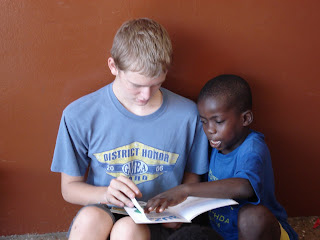
Mary Kay writes...
Another lesson in "be careful what you wish for" came yesterday afternoon. I had spent a little time moping this week about how shallow our relationships with Ghanaians sometimes seem. It may be cultural misunderstanding, or just that we do things differently? Anyway, as I delivered Christmas gifts to various pastors and others, I was feeling a little sorry for myself, thinking that the gift giving seemed pretty one-sided.
But, yesterday we returned from a couple of days at the beach to quite a surprise. As we carried our wet towels and sandy bags into the house, our security man told me that someone had dropped by a Christmas present for us - a truly Ghanaian Christmas present of rice, palm oil,and a guinea fowl. I walked in the house and saw the rice and oil sitting on the floor. But where was the guinea fowl? I looked in the refrigerator and the freezer, but I didn't see anything that looked like guinea fowl meat.
Then I started cleaning up from the trip, and went to throw out some trash from our snacks in the car. As I started to drop the paper into the kitchen trash can, a small movement caught the corner of my eye. I had found my guinea fowl - it was alive!
I had to smile - a live bird for Christmas. When Charlie worked at UPS, they used to give us a frozen turkey every year. Prior to the Depression, they had actually delivered a live turkey to each employee's family. We used to laugh at the image of the UPS man having to wrestle a live turkey up to our front door during the Christmas rush. Now we were living that story!
I called the rest of the family in to see our Christmas present. The boys immediately sent up howls of protest that the "poor bird" was being held captive in our trash bin. Then they asked what I would do with it. Needless to say, my response of "wring its neck and eat it" was not well received. Chip and Ken were absolutely not going to eat anything that they had seen alive, even if the fowl did not become a pet. And never mind that the chicken and beef they eat every night for dinner was once alive.
So the guinea fowl went home with Jasper, our driver. He was very appreciative, and I am sure his family feasted well today. But I was a little disappointed. I was looking forward to finding out if I really had enough pioneer stock in me to wring a bird's neck, pluck it, and cook it for our dinner. It's probably easier to just go buy a frozen chicken at Max Mart, though. What wimps we are!
Give thanks to the LORD, call on his name; make known among the nations what he has done. ... They asked, and he brought them quail and satisfied them with the bread of heaven. Psalm 105:1, 40













